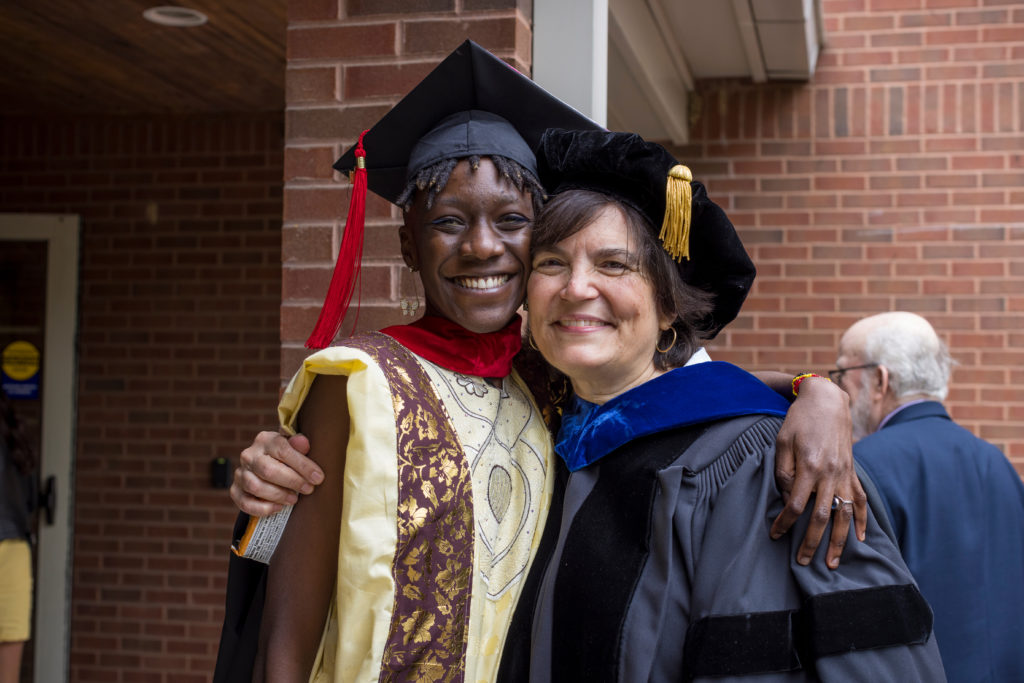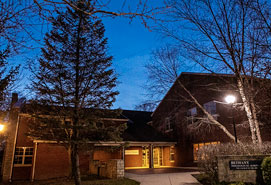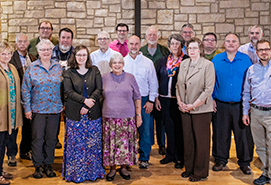MASST Sets Sail

For students who hear a clear call and are following a specific path to practical ministry, Bethany Theological Seminary has launched a new master’s degree program that links spiritual formation with a focus on social change.
The Master of Arts in Spiritual and Social Transformation (MASST) degree program launches in the fall of 2021 and will significantly broaden the seminary’s offerings to students who want to focus and specialize their ministries. The program is designed to serve individuals pursuing careers in non-profit leadership, social services, or spiritual direction. This new program is uniquely positioned to link Bethany’s Brethren heritage to the interests and needs of current students. According to Academic Dean Steve Schweitzer, the degree is a natural outgrowth of Bethany’s mission and draws on the strengths of the seminary’s stellar faculty. The program is also a thoughtful response to trends across theological education in the United States, and it is only the second master’s program in the nation to focus on spiritual and social transformation in this combination and integrative way.
“In recent years, seminaries are conferring more Master of Arts than Master of Divinity degrees,” notes Schweitzer. “It makes sense for us to continue to expand our offerings, and we want to start with what we know we can do well.”
The Church of Brethren has, of course, always connected spiritual formation with a passion for social transformation. The new degree provides students with options to deepen their faith and enrich their present and future ministries. Students will be able to take most of the required courses at a distance from campus, and benefit from the same generous financial aid that is available to students in all Bethany programs. MASST will appeal to students who wish to pursue advanced degrees while continuing to work in their own communities.
This is the latest addition to Bethany’s robust offerings, which include the Master of Arts in Theopoetics and Writing, six certificate programs, as well as the updated Master of Divinity and Master of Arts programs. These expanded offerings will allow Bethany to build on its recent positive enrollment trends and appeal to new categories of students.
“This new program allows students another educational option to pursue their vocational call through unique courses and practical experiences. We’ve designed this professional master’s degree to be flexible and focused in light of student interests and needs,” Schweitzer says.
One such student is Desiree Weaver-Spidel, who enrolled at Bethany in January 2021. She initially enrolled as a Master of Divinity student, but she has long been interested in incorporating spiritual direction into her professional work.
“Before coming to Bethany, I researched some training programs for spiritual direction, but nothing felt quite right — until now,” she says. “I think this is exactly the right program for me.”
Weaver-Spidel has worked for the last 10 years in non-profit organizations focused on human services. She notes that she spends a lot of time helping to meet the physical and social needs of the individuals she serves, but she feels that the program could prepare her to respond better to spiritual needs.
“There is more that I could do to bring people to support people on their journeys to wholeness and health, and I think this program will help me do that,” she says. “The combination of a strong foundation in theological and biblical studies along with formal training in spiritual direction skills will prepare me well for my ministry,” says Weaver-Spidel
“In my work, I return to the question, ‘how can we discern God in the world?’ I am not sure where my professional path will lead, but I think the Master of Arts in Spiritual and Social Transformation program will help me pull pieces together so that I can be a part of bringing God’s healing, wholeness, and justice to the world.”
In addition to the focus in Spiritual Practices and Direction (which is offered in partnership with Oasis Ministries of Pennsylvania), students in the program can choose from Non-Profit Leadership (in partnership with Eastern Mennonite University) as well as concentrations in Argument and Meditation and Public Theology and Witness. All concentrations will benefit from Bethany’s existing strengths, and students will learn alongside those who are seeking certificates, other MA degrees, and the MDiv.
Susu Lassa, a residential student entering her second year at Bethany, has chosen to switch to the MASST program from the MA in peace studies.
“I have always seen myself headed toward some form of non-traditional ministry, so MASST has a lot of appeal for me,” says Lassa, who has chosen the Non-Profit Leadership Path. “In addition to a really strong foundation in theology, there are courses that will give me really concrete skills in areas like grant writing. I know those things will benefit me after I graduate and go on to work with an organization focused on policy and advocacy.”
For Lassa, the focus on practice is key. Before beginning her studies at Bethany, Lassa worked at the Brethren Volunteer Service office in Washington D.C., and she is contemplating a return to similar work. She notes that her graduate work thus far has focused on Womanist Theology. While she has deeply appreciated the opportunity to immerse herself in academic work, she wants to discover ways to put what she has learned to direct, positive use — wherever life takes her.
“My focus is on liberation theology, and I believe my own freedom will come when I can settle down somewhere, organize with my neighbors, and center the unique needs of the people around me,” she says. “It is by creating community that we all can survive and thrive, and I think MASST will give me skills to help me build that sort of community with others.”
Bethany’s faculty hope that no matter which path students choose, this new degree program will allow them to tailor the educational experience to their own needs.
“For anyone who is ready to say, ‘this is my call and this is my path,’ this degree is a way to name and claim your ministry and your career,” says Dean Schweitzer.
President Jeff Carter notes that the development of the professional MA program was motivated by a growing sense that there is a need for advanced biblical and theological education among those who are not seeking ordination.
“In the Church of the Brethren and in many other denominations, there is a clear sense that the world needs faith leaders who are ready to serve outside the walls of traditional churches,” notes Carter. “Bethany will always prepare students for traditional pastoral ministry, but we also need to remain nimble and responsive to the changing needs of the world. This new degree will help the Seminary to broaden its appeal and engage a new and diverse population of students — including those who have already established a clear career path. All of us are really excited to welcome students in this new program to the Bethany community.”
As is true for all Bethany degree programs, MASST students will have access to generous financial aid, including the Pillars and Pathways Residential Scholarship, which allows students to earn a graduate degree without taking on additional student or commercial debt. The Seminary has negotiated arrangements with its educational partners to remove financial and logistical barriers for those students who will complete courses offered through both Bethany and a partner institution.
“We are grateful to our colleagues at Eastern Mennonite University and Oasis Ministries for the vision, confidence, and flexibility they will bring to this venture,” says Carter. “This is a wonderful opportunity for all who are answering a call to practical ministry.”
MASST at a Glance
This degree prepares graduates to:
- Interpret scripture, tradition, and theology
- Communicate faith and values with contextual awareness
- Integrate learning that focuses on spiritual and social understandings and practices of transformation
- Demonstrate theologically informed reflective practice that anticipates and embodies ministry
MASST requirements:
The degree requires 36 credit hours, including core courses, a Path, a practicum, and electives. Bethany offers both in-person and online courses, and MASST students will have the opportunity to learn alongside students in the Seminary’s Master of Divinity, Master of Arts, Master of Arts in Theopoetics and Writing, and certificate programs.
Key partnerships:
Students interested in non-profit leadership will take online courses offered by Eastern Mennonite University as they pursue their path.
For students interested in spiritual direction, there are two paths — both offered in partnership with Oasis Ministries.
Bethany offers a financial subsidy to help students cover the costs of courses at our partner institutions.








 Green Circle: Bethany invests in 100% renewable energy.
Green Circle: Bethany invests in 100% renewable energy.